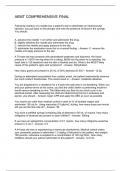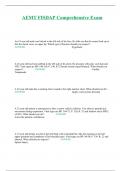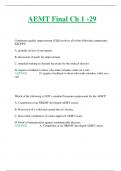Aemt comprehensive final Study guides, Class notes & Summaries
Looking for the best study guides, study notes and summaries about Aemt comprehensive final? On this page you'll find 20 study documents about Aemt comprehensive final.
All 20 results
Sort by
 Popular
Popular
-
AEMT Comprehensive Final
- Exam (elaborations) • 9 pages • 2023 Popular
-
Available in package deal
-
- $11.49
- 1x sold
- + learn more
Following insertion of a needle into a patient's skin to administer an intramuscular injection, you pull back on the plunger and note the presence of blood in the syringe. You should: A. advance the needle 1 cm further and administer the drug. B. slightly withdraw the needle and administer the drug. C. remove the needle and apply pressure to the site. D. administer the medication since this is a normal finding. - Answer- C. remove the needle and apply pressure to the site. A 70-year-o...

-
AEMT Comprehensive Final
- Exam (elaborations) • 12 pages • 2024
- Available in package deal
-
- $11.49
- + learn more
AEMT Comprehensive Final Following insertion of a needle into a patient's skin to administer an intramuscular injection, you pull back on the plunger and note the presence of blood in the syringe. You should: A. advance the needle 1 cm further and administer the drug. B. slightly withdraw the needle and administer the drug. C. remove the needle and apply pressure to the site. D. administer the medication since this is a normal finding. - ANSWER ...
 Popular
Popular
-
AEMT FISDAP Comprehensive Exam
- Exam (elaborations) • 19 pages • 2024
- Available in package deal
-
- $12.49
- 2x sold
- + learn more
AEMT FISDAP Comprehensive Exam An 18 year old male was kicked in the left side of his face. He tells you that he cannot look up or feel his cheek, nose, or upper lip. Which type of fracture should you suspect? - ANSWER Zygomatic A 26 year old has been stabbed in the left side of his chest. He presents with pale, cool skin and JVD. Vital signs are BP: 140/120, P: 140, R 32 breath so...
Exam (elaborations) AEMT FINAL EXAM PREP 2 Exam (elaborations) AEMT FISDAP Comprehensive Exam 3 Exam (elaborations) AEMT Comprehensive Final
Exam (elaborations) AEMT FINAL EXAM PREP 2 Exam (elaborations) AEMT FISDAP Comprehensive Exam 3 Exam (elaborations) AEMT Comprehensive Final
AEMT COMPREHENSIVE FINAL’

-
AEMT Comprehensive Final QUESTIONS AND ANSWERS| GRADED A+
- Exam (elaborations) • 17 pages • 2022
-
Available in package deal
-
- $11.99
- 1x sold
- + learn more
An AEMT administers 1,000 ml of IV fluid to a patient with severe pulmonary edema and a stable B/P. The pt then develops profound respiratory distress and becomes apneic. What is this situation an example of? Correct Answer: Gross Negligence. Perfusion is defined as Correct Answer: the circulation of oxygenated blood within an organ or tissue in adequate amounts to meet the cells current needs. All of the following can lead to shock (hypoperfusion) Except Correct Answer: Increased venou...

-
AEMT Comprehensive Final QUESTIONS AND ANSWERS| GRADED A
- Exam (elaborations) • 17 pages • 2022
-
Available in package deal
-
- $10.49
- + learn more
Following insertion of a needle into a patient's skin to administer an intramuscular injection, you pull back on the plunger and note the presence of blood in the syringe. You should: A. advance the needle 1 cm further and administer the drug. B. slightly withdraw the needle and administer the drug. C. remove the needle and apply pressure to the site. D. administer the medication since this is a normal finding. Correct Answer: C. remove the needle and apply pressure to the site. A 7...

-
AEMT Final 2023
- Package deal • 8 items • 2024
-
- $35.49
- + learn more
Exam (elaborations) AEMT Final Ch 1 -29 2 Exam (elaborations) FISDAP OPERATIONS 3 Exam (elaborations) AEMT Final 4 Exam (elaborations) AEMT Exam 1 5 Exam (elaborations) AEMT FISDAP Comprehensive Exam 6 Exam (elaborations) AEMT Final Test 2020 7 Exam (elaborations) AEMT FINAL EXAM STUDY 8 Exam (elaborations) AEMT Final 2023

-
AEMT Final Test 2020
- Exam (elaborations) • 40 pages • 2024
- Available in package deal
-
- $12.49
- + learn more
AEMT Final Test 2020 A trauma patient complains of pain to the costovertebral angle. The organ(s) MOST likely injured is/are the: A. liver B. bladder C. spleen D. kidneys - ANSWER kidneys pg.291 A patient with a core body temperature of 85F would be expected to present with: A. profoundly slow respirations B. deep, rapid respirations C. confusion or lethargy D. uncontrolled shivering - ANSWER profoundly slow ...

Do you wonder why so many students wear nice clothes, have money to spare and enjoy tons of free time? Well, they sell on Stuvia! Imagine your study notes being downloaded a dozen times for $15 each. Every. Single. Day. Discover all about earning on Stuvia




